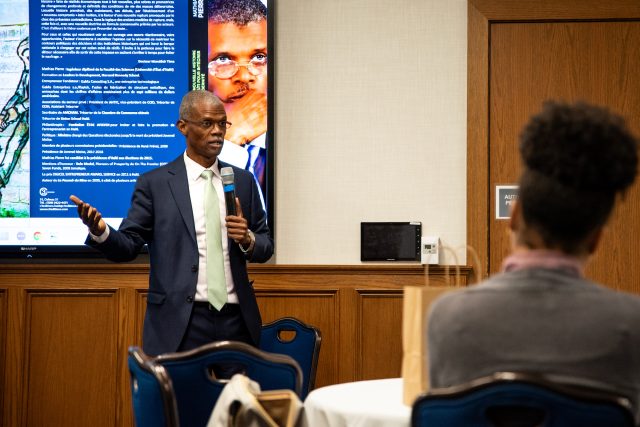[ad_1]
About 30 University of Michigan community members gathered in the Michigan Union Friday morning to hear from a variety of speakers on the historical context of contemporary issues in Haiti in a symposium hosted by the University of Michigan and the Haitian Midwest Scholars Society.
The symposium featured scholars and specialists in Haitian studies, as well as Haitian filmmakers and journalists.
Social Work student Nelson Jean Francois, organizer of the symposium, said in an interview with The Michigan Daily he hoped the event would serve to raise awareness about current events in Haiti and place them in proper context.
“People don’t really understand what’s going on there,” Jean Francois said. “When you talk to professors, students, the first question they ask you is ‘what’s going on with Haiti?’ So I said, let’s contextualize that and help them have some responses so that they can better understand what’s going on.”
Vincent Joos, associate professor at Florida State University, presented on the history of Haiti, discussing the French occupation of the country through the 17th and 18th century and how the Haitian Revolution put the country into debt.
“When the French could not enslave the people anymore in Haiti, starting in 1793, they forced the country to pay a massive debt in order to reimburse them for the property loss — both land and people were considered then as lost property,” Joos said. “This is why Haiti was never able, in the 19th century, to develop its infrastructure.”
Jackie Goodrich, research associate professor at the School of Public Health, spoke about the large number of U.S. rice imports to Haiti and how increased support for local agriculture could bolster the Haitian economy.
“If agriculture can be supported by their government in the same way that we support agriculture here — even things like helping people get tractors and pieces of farm equipment — that could make a huge difference in a community agricultural program,” Goodrich said.
Dieu-Nalio Chery, freelance photojournalist from Haiti, showed some of his work to the crowd and spoke on the dangers he faced while taking the photos. He recounted being shot while taking photos for a parliamentary event and said his rising fame as a photojournalist forced him to flee his home.
“With all this fame, me, as I love my country, I had to leave,” Chery said. “Due to the corruption, due to the bad leaders that mix with the international community — (they) make Haiti like that”
Mark Schuller, Northern Illinois University professor and affiliate professor at Université d’État d’Haiti, described the lack of solutions coming from non-governmental organizations in Haiti, arguing that they have not gone the distance to create lasting change.
“If you look at the data about the effectiveness of NGOs, it is about visibility,” Schuller said. “And visibility is what was behind a lot of the decisions to, for example, pay private companies that are politically connected to truck in water, as opposed to fixing the state run water taps at a fraction of the cost.”
Filmmaker and journalist Obed Lamy showed his film “Did You Test Me?”, a documentary sharing the story of a woman who faced discrimination for her Haitian heritage. Michael Deibert, journalist, author and researcher at the Centro de Estudos Internacionais, an organization dedicated to conducting research to address global challenges, spoke on the prevalence of gang violence in Haiti.
“I should stress the majority of people have nothing to do with crime or violence,” Deibert said. “Military might alone will not fix what ails Haiti. There needs to be a dialogue. What kind of country will Haiti be for whom and when? What will justice look like for those who have suffered for so long? In what form will it come, and from whom?”
Mathias Pierre, a former minister in charge of elections in Haiti in 2021 and former presidential candidate in Haiti, spoke on the Haitian reliance on international solutions and the need for a national strategy to create change.
“The elites, for the most part, stop thinking of solution(s) for Haiti’s problems, they rely on solution(s) coming from the international community, especially the United States,” Pierre said. “How can Haiti escape this vicious circle to enter a virtuous circle? … Achieving this goal is only possible through the identification of national resources — local and foreign — available in the country, which offers opportunity for job creation.”
Music, Theatre & Dance junior Maddy Ringo said she was grateful for the chance to learn more about Haiti through the symposium event.
“I’m really interested in Haiti — the political situation in Haiti has been on my radar for my whole life,” Ringo said. “I know a lot about the history of it, but I wanted to understand the current situation.”
Ringo said she believes Americans must consider their impacts on other countries and intentionally seek out opportunities to learn more. “I think it’s really important to understand more deeply our situation as Americans,” Ringo said. “I think the question of imperialism and its very real, lasting effects are something that I think we really need to understand.”
Daily Staff Reporter Elizabeth Stafford can be reached at libstaf@umich.edu.
Related articles
[ad_2]
Source link











